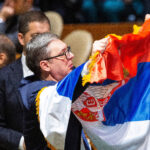- Kosovo Parliament becomes associate member in NATO Parliamentary Assembly.
The majority of countries voted “for” the motion with one vote “against” while another 14 countries abstained at the meeting of the Assembly in Sofia (Bulgaria). Among those who abstained were countries that did not recognize Kosovo’s independence – Spain, Romania, Slovakia, and Greece, as well as France and Italy. Hungary was the only nation that opposed the move.
Prior to the decision, the Parliament of Kosovo had for years maintained an observer status.
Serbia is also among the associated members of the NATO PA. The Serbian delegation left the session hall immediately after the vote.
In Belgrade, the decision of the NATO PA was perceived as targeted pressure on Serbia on the part of the West.
“The acceptance of the so-called Kosovo as an associate member of the NATO Parliamentary Assembly exposed the entire policy of double standards in the West, which once again rewarded its brainchild for all violations of the agreement and terror against the Serbian people in Kosovo and Metohija,” said Director of the Kosovo and Metohija Affairs Department at the Government of Serbia, Petar Petkovic.
He explained the “strong pressure on Serbia and the Serbian people” by the fact that “a strong Serbia led by Aleksandar Vučić is a thorn in the side of many Western nations.”
- UN General Assembly passes Resolution on Srebrenica genocide.
The document establishes an annual International Day of Remembrance and Commemoration of the 1995 Genocide. The resolution also condemns any denial of the genocide in Srebrenica.
Eighty-four countries voted in favor (including three of the five permanent members of the UN Security Council – the USA, UK, and France). Nineteen countries voted against it (including permanent members of the UN Security Council – Russia and China). Another 68 nations abstained, and 22 did not vote.
As for the Balkan and Central European region, Serbia and Hungary voted against the resolution while Slovakia and Greece abstained. The rest backed the document.
Meanwhile, Serbian leaders saw the outcome of the vote in the UN General Assembly as a “great moral victory”. “107 countries around the world did not vote for the resolution”, “two-thirds of the inhabitants of the planet were on our side”, according to Vučić.
- Republika Srpska preparing “peaceful division” of Bosnia and Herzegovina
President of Republika Srpska Milorad Dodik called the Resolution on Srebrenica a symbolic end of multi-ethnic Bosnia and Herzegovina. “Of course, I think this is the end. How can the two peoples with such strongly opposite pasts live along?” Dodik told RTS on the eve of the UN vote.
At the same time, he emphasized that the Serbs in Bosnia and Herzegovina are determined to maintain peace. “Our priority is to preserve peace, and we will preserve peace, none of our actions will be aimed at destabilization and violence,” he said.
In another statement issued ahead of the UNGA vote, the leader of Republika Srpska noted that an agreement on peaceful disengagement will be put forward within the next 30 days.
“We will propose first to clarify the political competences related to the entities, as well as to preserve and leave the current model of economy’s functioning and adapt it to the model of peaceful disengagement in several years,” said Dodik.
Statements by the leader of the Bosnian Serbs show that he remains on the path toward the secession of Republika Srpska, now with an emphasis on achieving the goal in a peaceful manner. At the same time, analysts warn that the path to a peaceful disengagement is unlikely to become a reality.
For a “peaceful disengagement,” the Constitution of Bosnia and Herzegovina should be amended and the possibility of a referendum on the issue should be foreseen. Representatives of Bosniaks and Croats, as well as the international community, primarily members of the UN Security Council – the U.S., Russia, China, the UK, and France – should agree to Republika Srpska’s secession from BiH.
- Montenegrin Serbs to demand extension of their rights
The Democratic People’s Party (DNP) of Montenegro, which is part of the ruling coalition, condemned Montenegro’s vote for the Srebrenica Genocide Resolution in the UN General Assembly and suspended support for the government. The DNP, led by Milan Knezevic, threatens to leave the ruling coalition if a number of its demands are not met. This is, primarily, about the adoption of the Resolution on the genocide in Jasenovac.
In order to continue cooperation within the ruling coalition, the DNP put forward several more requirements, such as:
• recognizing the Serbian language as official in Montenegro;
• introducing dual citizenship with Serbia;
• recognizing the tricolor (red-blue-white flag) as the state flag of Montenegro.
Speaker of the Parliament of Montenegro and leader of the New Serbian Democracy (NSD) Andrija Mandić also made similar demands. At the same time, NSD never announced its withdrawal from the ruling coalition.
Thus, the Serbian parties that are part of the current Montenegrin government seek to achieve a change in the political system of Montenegro to turn the country into Serbia’s satellite.
- Kosovo shuts down Serbian bank’s branch
The Kosovo police closed branches of the “Postal Savings Bank” of Serbia (Banka Poštanska štedionica) in four municipalities in the north of Kosovo – Leposavic, Zubin Potik, Zvečan, and North Mitrovica.
“Six subsidiaries of the so-called ‘Postal Savings Bank’ in the north of the country were closed,” the Kosovo police said in a statement.
The Central Bank of Kosovo (CBK) said that Poštanska štedionica does not hold a valid license to operate under Kosovo laws, adding that the activities of financial institutions without a license are “illegal and unacceptable”.
The Deputy Chief of Police of the Northern Region, Veton Elshani, said that the move had been warranted by the prosecutor, and the premises were inspected alongside tax officials. As a result of the raid, tangible evidence was seized, including 1,600,000 euros, 74,700,000 dinars, 19,500 francs, 13,800 US dollars, and other cash currency, as well as paperwork.
Serbia, the EU and the USA see Pristina’s actions as a move aimed at escalating tensions in the region.
Serbian Deputy Prime Minister and Interior Minister Ivica Dacic said: “If the international community fails to come to its senses, all this will lead to new conflicts in the Balkans with unpredictable implications.”
The U.S. Department of State said it was disappointed that police took action at financial institutions in the north of the Republic of Kosovo, stressing that the move “was not coordinated with international partners and it escalates tensions”.
The European Union condemned the closure of the Postal Savings Bank offices in Kosovo and called on Belgrade and Pristina to return to the negotiating table. Peter Stano, EU spokesman for foreign and security policy, noted that the operations of the Kosovo police are an escalating and unilateral step by Pristina, which the EU perceives with concern.



